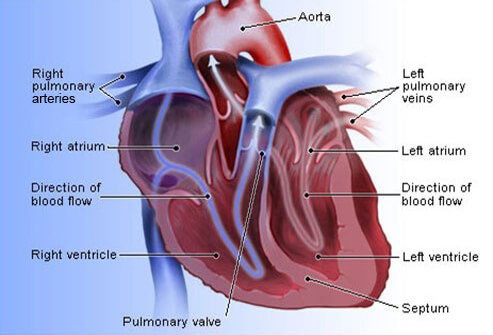
Diagnosed with Cancer? Your two greatest challenges are understanding cancer and understanding possible side effects from chemo and radiation. Knowledge is Power!
Learn about conventional, complementary, and integrative therapies.
Dealing with treatment side effects? Learn about evidence-based therapies to alleviate your symptoms.
Click the orange button to the right to learn more.
- You are here:
- Home »
- Blog »
- side effects ID and prevention »
- PostOperative Mortality following Surgery?
PostOperative Mortality following Surgery?

What is the association between severity of heart failure and risk of postoperative mortality among patients undergoing ambulatory surgery?
I am a cancer survivor living with cardiomyopathy as well as atrial fibrillation (Afib). As such, my risk of mortality is higher than a normal person undergoing regular ambulatory surgery.
Knowing this, it is in my best interest to keep my heart in as good shape as possible. I don’t take any conventional heart meds such as:
- ACE inhibitors
- Aldosterone antagonists
- Angiotensin II receptor blockers (ARBs)
- Beta-blockers
- Calcium channel blockers
- Cholesterol-lowering drugs
It’s a long story but basically, I don’t do well with any form of conventional medications. That leaves me with evidence-based non-conventional medications or therapies shown to keep my heart as healthy as possible. Non-conventional heart therapies such as:
- CoQ10
- Omega-3 fatty acids
- Cacao
- N-acetyl carnitine
- Moderate, daily exercise
- CBD oil, others
What therapies can reduce my risk of mortality as a heart failure patient undergoing surgery?
As a heart failure patient undergoing surgery, several therapies can help reduce your risk of mortality and improve outcomes:
- Medication Management: Ensure you are taking your prescribed medications regularly, including beta-blockers, ACE inhibitors, angiotensin receptor blockers (ARBs), diuretics, and aldosterone antagonists. These medications help manage symptoms, reduce fluid buildup, and improve heart function.
- Preoperative Optimization: Work closely with your healthcare team to optimize your condition before surgery. This may involve adjustments to your medication regimen, fluid management, and addressing any underlying conditions like diabetes or hypertension.
- Lifestyle Modifications: Adopting a heart-healthy lifestyle can significantly improve outcomes. This includes maintaining a balanced diet low in sodium, saturated fats, and cholesterol, engaging in regular physical activity as recommended by your healthcare provider, avoiding smoking, and limiting alcohol intake.
- Cardiac Rehabilitation: Participating in a cardiac rehabilitation program before and after surgery can help improve cardiovascular fitness, reduce risk factors, and enhance recovery.
- Close Monitoring: Ensure you are closely monitored by your healthcare team before, during, and after surgery. This may involve regular check-ups, blood tests, and imaging studies to assess heart function and detect any complications early.
- Optimized Anesthesia Management: Work with your anesthesiologist to ensure anesthesia is administered safely, taking into account your heart condition and any medications you are taking.
- Education and Support: Educate yourself about your condition, treatment options, and what to expect before and after surgery. Having a strong support system in place can also help alleviate anxiety and improve coping mechanisms.
- Advanced Therapies: In some cases, advanced therapies such as cardiac resynchronization therapy (CRT) or implantable cardioverter-defibrillators (ICDs) may be recommended to help manage heart failure symptoms and reduce mortality risk.
- Psychological Support: Managing stress, anxiety, and depression is important for overall well-being and can indirectly impact heart health. Seek support from mental health professionals if needed.
- Postoperative Care: Follow your healthcare team’s instructions for postoperative care carefully, including medication management, wound care, and rehabilitation exercises. Attend all follow-up appointments to monitor your progress and address any concerns promptly.
I don’t plan on undergoing any surgeries anytime soon. But let’s be honest. Each of us might have to go under the knife for some reason someday.
One of my long-term side effects is steroid-induced avascular necrosis. The articles linked below give me yet another reason not to undergo surgery to fix my joints.
Over the past 30 or so years since I was diagnosed with cancer and spent several years undergoing a variety of conventional cancer therapies, I’ve come to realize that there are many ways to manage health problems OTHER than conventional medications or conventional therapies such as surgery.
That’s a big statement of course, and I have to take each health issue individually. Surgery may be the best therapy for the particular heal issue. In the case of my avascular necrosis, weekly acupuncture sessions is working just fine.
My point is that the vast majority of adults who experience a health problem assume that there is a medication or a surgical procedure that will improve or cure whatever the problem is. I’m saying that it isn’t so easy all the time.
Are you a cancer patient? Are you a cancer survivor who is struggling with long-term side effects? If you’d like to learn more about evidence-based non-conventional therapies please send me an email- David.PeopleBeatingCancer@gmail.com
Hang in there,
David Emerson
- Cancer Survivor
- Cancer Coach
- Director PeopleBeatingCancer
Association Between Heart Failure and Postoperative Mortality Among Patients Undergoing Ambulatory Noncardiac Surgery
“Question What is the association between severity of heart failure and risk of postoperative mortality among patients undergoing ambulatory surgery?
Findings In this cohort study of 355 121 patients undergoing ambulatory surgery, the crude 90-day mortality was 2.00% among patients with heart failure and 0.39% among patients without heart failure. The crude risk of 30-day postoperative complications was 5.7% among patients with heart failure and 2.7% among patients without heart failure.
Meaning Heart failure with or without symptoms was associated with increased risk of 90-day mortality and 30-day postoperative complications…
Conclusions and Relevance In this study, among patients undergoing elective, ambulatory surgery, heart failure with or without symptoms was significantly associated with 90-day mortality and 30-day postoperative complications. These data may be helpful in preoperative discussions with patients with heart failure undergoing ambulatory surgery.”
Heart Failure and Mortality Rates Following Noncardiac Surgeries
“Investigators examined a cohort of more than 350,000 patients and found that patients with HF, with or without symptoms, had increased rates of 30- and 90-day mortality following noncardiac surgery…
The 30-day complication rate and 90-day all-cause mortality rates served as the primary outcomes of the study.
The secondary outcomes were 30-day
- postoperative cardiac arrest,
- myocardial infarction,
- stroke,
- surgical site infection,
- urinary tract infection, and
- 72-hour postoperative bleeding event
Investigators found that 5.5% (19,353) of the 355,121 included in the study had HF.
Upon analyses, investigators found that patients with HF had higher rates of 90-day postoperative mortality than patients without HF


